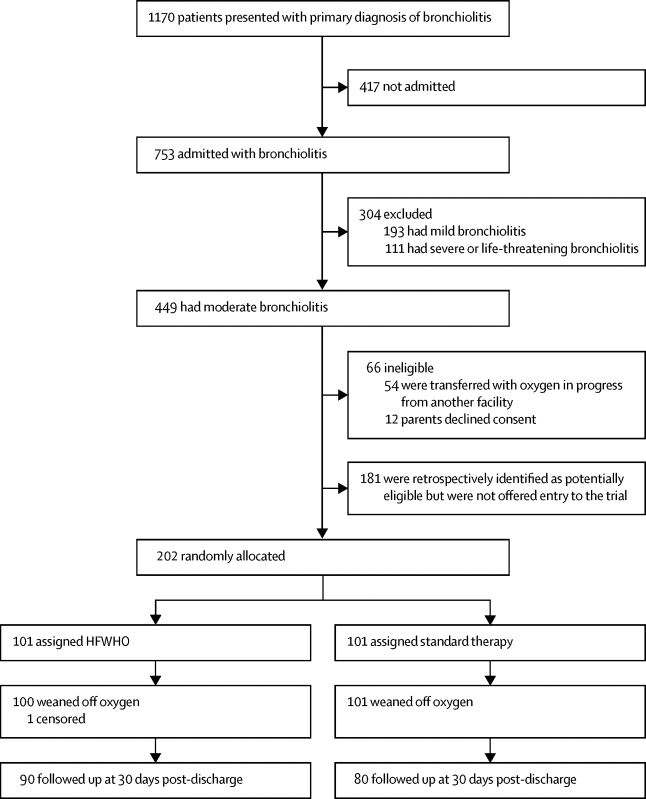High-flow warm humidified oxygen versus standard low-flow nasal cannula oxygen for moderate bronchiolitis (HFWHO RCT): an open, phase 4, randomised controlled trial
Elizabeth Kepreotes, Bruce Whitehead, John Attia, et al
Lancet 2017; 389: 930-939
Summary
Background 背景
Bronchiolitis is the most common lung infection in infants and treatment focuses on management of respiratory distress and hypoxia. High-flow warm humidified oxygen (HFWHO) is increasingly used, but has not been rigorously studied in randomised trials. We aimed to examine whether HFWHO provided enhanced respiratory support, thereby shortening time to weaning off oxygen.
细支气管炎是婴儿最常见的肺部感染,治疗重点在于呼吸窘迫及缺氧的处理。高流量加温加湿氧疗(HFWHO)的应用逐渐普遍,但尚未经过随机试验验证。我们此项研究的目的在于验证HFWHO是否能够强化呼吸支持,从而缩短氧疗时间。
Methods 方法
In this open, phase 4, randomised controlled trial, we recruited children aged less than 24 months with moderate bronchiolitis attending the emergency department of the John Hunter Hospital or the medical unit of the John Hunter Children's Hospital in New South Wales, Australia. Patients were randomly allocated (1:1) via opaque sealed envelopes to HFWHO (maximum flow of 1 L/kg per min to a limit of 20 L/min using 1:1 air–oxygen ratio, resulting in a maximum FiO2 of 0·6) or standard therapy (cold wall oxygen 100% via infant nasal cannulae at low flow to a maximum of 2 L/min) using a block size of four and stratifying for gestational age at birth. The primary outcome was time from randomisation to last use of oxygen therapy. All randomised children were included in the primary and secondary safety analyses. This trial is registered with the Australian New Zealand Clinical Trials Registry, number ACTRN12612000685819.
这是一项开放,4期,随机对照试验。我们入选了澳大利亚新南威尔士州John Hunter医院急诊科或John Hunter儿童医院内科就诊的中度细支气管炎且年龄不足24个月的儿童。采用不透明的密封信封,患者按照1:1的比例随机分为HFWHO组(最大流量1 L/kg/min,不超过20 L/min,空气氧气比例1:1,最高FiO2 0.6)或标准治疗组(通过婴儿鼻导管提供冷的墙壁供氧100%,低流量不超过2 L/min),区组大小为4,且根据出生时孕龄分层。主要预后指标为随机分组至最后使用氧疗的时间。所有随机分组的儿童均纳入主要及次要安全性分析。试验在澳大利亚及新西兰临床试验注册网站注册,注册号ACTRN12612000685819。
Findings 结果
From July 16, 2012, to May 1, 2015, we randomly assigned 202 children to either HFWHO (101 children) or standard therapy (101 children). Median time to weaning was 24 h (95% CI 18–28) for standard therapy and 20 h (95% CI 17–34) for HFWHO (hazard ratio [HR] for difference in survival distributions 0·9 [95% CI 0·7–1·2]; log rank p=0·61). Fewer children experienced treatment failure on HFWHO (14 [14%]) compared with standard therapy (33 [33%]; p=0·0016); of these children, those on HFWHO were supported for longer than were those on standard therapy before treatment failure (HR 0·3; 95% CI 0·2–0·6; p<0·0001). 20 (61%) of 33 children who experienced treatment failure on standard therapy were rescued with HFWHO. 12 (12%) of children on standard therapy required transfer to the intensive care unit compared with 14 (14%) of those on HFWHO (difference −1%; 95% CI −7 to 16; p=0·41). Four adverse events occurred (oxygen desaturation and condensation inhalation in the HFWHO group, and two incidences of oxygen tubing disconnection in the standard therapy group); none resulted in withdrawal from the trial. No oxygen-related serious adverse events occurred. Secondary effectiveness outcomes are reported in the Results section.
从2012年7月16日至2015年5月1日,我们将202名儿童随机分至HFWHO组(n = 101)或标准治疗组(n = 101)。标准治疗组至脱离氧疗时间为24 h (95% CI 18–28),HFWHO组为 20 h (95% CI 17–34),(生存分布差异风险比[HR] 0·9 [95% CI 0·7–1·2]; log rank p=0·61)。HFWHO组更少患儿经历治疗失败(14 [14%]) vs. 标准治疗组 (33 [33%]; p=0·0016);宣告治疗失败前,HFWHO组接受治疗时间长于标准治疗组(HR 0·3; 95% CI 0·2–0·6; p<0·0001)。标准治疗组中33名患儿治疗失败,其中20名 (61%) 采用HFWHO进行挽救治疗。标准治疗组12名 (12%) 患儿需要转入ICU,HFWHO组为14名 (14%) (差异−1%; 95% CI −7 to 16; p=0·41)。
Interpretation 结论
HFWHO did not significantly reduce time on oxygen compared with standard therapy, suggesting that early use of HFWHO does not modify the underlying disease process in moderately severe bronchiolitis. HFWHO might have a role as a rescue therapy to reduce the proportion of children requiring high-cost intensive care.
与标准治疗相比,HFWHO不能显著缩短氧疗时间,提示早期使用HFWHO不能改变中度严重程度细支气管炎的疾病进程。HFWHO可以作为挽救治疗措施,减少患者对费用昂贵的ICU的需求。
Funding
Hunter Children's Research Foundation, John Hunter Hospital Charitable Trust, and the University of Newcastle Priority Research Centre GrowUpWell.





